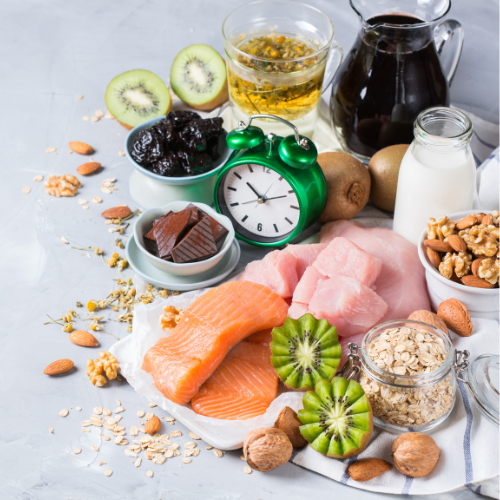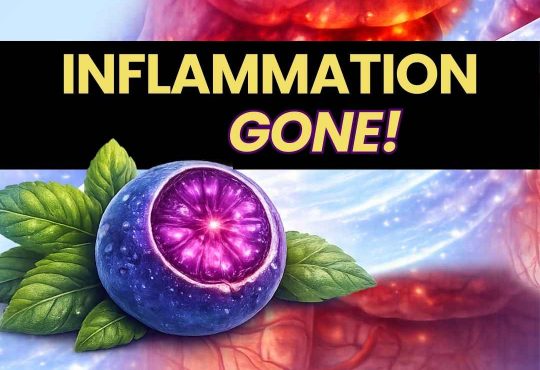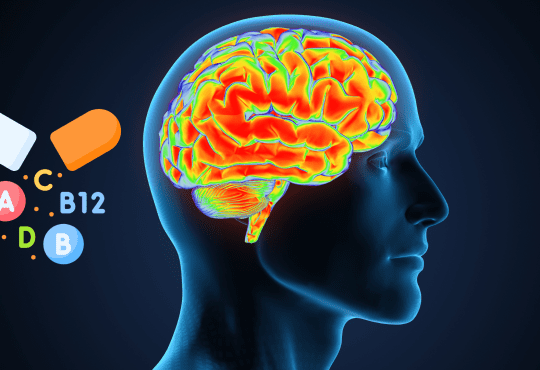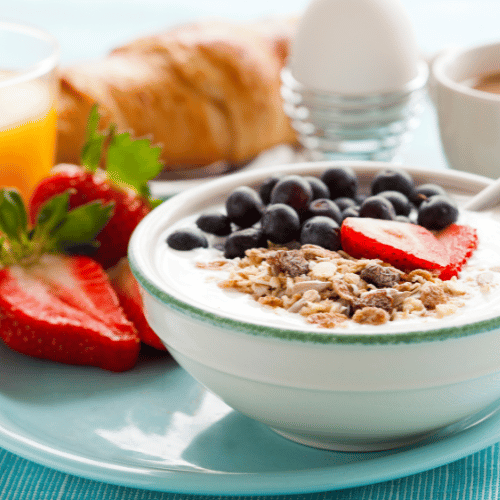
7 Incredible Foods To Help Balance Hormones
Hormonal balance plays a crucial role in our overall well-being, influencing everything from our mood to our metabolism.
With today’s lifestyle and dietary challenges, maintaining this delicate balance can sometimes feel like walking a tightrope.
But did you know that certain foods can be powerful allies in this quest?
Join us as we delve into the world of nutrition to uncover seven incredible foods that can naturally help balance your hormones.
Whether you’ve been feeling out of sync or are simply curious, this list might just have the answers you’re looking for.
Let’s dive in!
Number 7. Broccoli and Cruciferous Vegetables:
Alright, let’s chat about broccoli and its cool veggie cousins: cauliflower, Brussels sprouts, and kale.
You’ve probably heard they’re healthy, but they’re like the superheroes of the vegetable world when it comes to balancing hormones, especially for women.
Here’s the scoop:
When we chew on these veggies, they release this compound, indole-3-carbinol (I3C).
Sounds fancy, right? But what it does is even cooler.
As our body breaks it down further, it helps manage how estrogen, a major female hormone, behaves in our system.
It kind of nudges estrogen to take a beneficial path in our body instead of one that might raise health concerns.
But wait, there’s more! These veggies also pack a punch with something called sulforaphane.
This is Mother Nature’s detox agent, giving our liver a hand in getting rid of stuff we don’t need, including excess hormones.
Speaking of excess, ever heard of estrogen dominance?
It’s when there’s too much estrogen floating around compared to another hormone, progesterone.
This imbalance can sometimes lead to a few health problems.
But the good news? Broccoli and its crew can potentially help even things out.
And let’s not forget about fiber.
Beyond just being good for, you know, keeping things regular, fiber helps ensure excess hormones exit the building (or our body, in this case) rather than hanging around and causing potential mischief.
At number 6, let’s dive into the world of tiny but mighty: flaxseeds.
If flax seeds had a resume, it’d be stacked!
First up, they’re loaded with something called lignans. Think of lignans as your friendly neighborhood hormone balancers.
They’re especially good at playing peacekeeper with estrogen levels.
You see, sometimes, our estrogen can get a little, let’s say, overzealous.
But lignans are there, like a cool older sibling, making sure everything stays in check.
Now, onto omega-3 fatty acids. Most of us have heard of these, right?
Flaxseeds are like the VIP lounge for omega-threes.
These fatty acids are not just about heart health; they’re crucial for making hormones.
Plus, they’re anti-inflammatory rockstars.
And let’s face it, with our busy lives, who doesn’t need a little less inflammation?
So, if you’ve never tried flaxseeds, consider sprinkling them on your oatmeal or blending them into a smoothie.
They’re an easy way to give your body a little hormonal TLC.
Just remember, our bodies can’t break down whole flaxseeds, so opt for ground or milled versions to reap all the benefits.
Think of it as unlocking the treasure chest of goodness inside.
At Number 5. We have Avocados:
I’m sure most of you have seen it all over Instagram, smashed on toast, blended into smoothies, or even in those luscious green face masks.
But, did you know there’s a ton of science behind why this fruit is more than just a trendy treat?
First off, let’s talk about healthy fats. I can see some of you cringing at the word “fat”, but hear me out.
Our body needs certain fats to function at its best.
Think of fats as the secret messengers that help our hormones deliver messages around our body.
Now, avocados are loaded with these good fats, specifically monounsaturated fats.
A study published in the Journal of Nutrition found that avocados can actually help maintain good cholesterol levels.
That’s right! So, adding some avocado slices to your salad can be like sending a love note to your heart.
Now, let’s talk about fiber.
Did you know a single avocado has about 10 grams of fiber?
And why is fiber so important?
Apart from keeping things… umm, moving smoothly in the bathroom department, fiber also supports balanced hormone levels by helping remove excess hormones from our system.
A study in the Journal of Clinical Endocrinology & Metabolism highlighted how dietary fiber can influence hormone levels.
In simple terms, if you think of your body like a well-oiled machine, fiber is like the cleaner that ensures there’s no gunk buildup.
Alright, moving on to magnesium.
Ladies, ever had one of those days during your period where you feel like a tiny gremlin is just punching your abdomen?
Enter magnesium.
Found abundantly in avocados, magnesium is often dubbed the “natural relaxer”.
It’s not only great for your muscles but can also reduce those pesky menstrual cramps.
Several studies, like one in the American Journal of Obstetrics and Gynecology, have shown that magnesium supplements can be a game-changer during that time of the month.
Last but not least, let’s talk about potassium.
This awesome nutrient isn’t just for bananas. Avocados are packed with it too!
Potassium helps keep your blood pressure in check, which is super important for overall health.
According to a study from Archives of Internal Medicine, higher potassium intake is associated with lower rates of stroke and could be as important as decreasing sodium (salt) levels when it comes to lowering blood pressure.
In a nutshell (or should I say, avocado shell?), this creamy fruit is like a multi-tool for your body.
Whether it’s balancing hormones, supporting heart health, or just helping you feel better during your cycle, avocados have got you covered.
At number 4, we’ll journey into the aquatic world. Think about that delicious, pink-hued fish that graces many a plate – I’m talking about salmon.
You might’ve heard your fitness-loving friend rave about it or perhaps that family member who’s all about heart health.
But why’s there so much buzz about salmon?
Strap in, and let’s dive deep.
Let’s start with those omega-3 fatty acids.
I know it sounds super science-y, but stay with me. Omega-3s are like the peacekeepers in your body.
They swoop in and say, “Hey, inflammation, take a chill pill!”
And trust me, we want inflammation levels low, especially when it comes to hormonal balance.
High inflammation can throw those delicate hormone levels out of whack.
There was this study in the Journal of Endocrinology that found omega-3s help regulate the synthesis of hormones.
In other words, these fats help your body produce hormones in the right amounts.
Now, speaking of hormones, did you know your thyroid, that butterfly-shaped gland in your neck, plays a massive role in hormone production?
And if it’s not working at its best, you can feel sluggish, cold, or even gain weight.
The good news is that salmon can give your thyroid a helping hand.
This fish is loaded with selenium, a mineral that’s like a BFF to your thyroid.
According to a review in the Thyroid Research journal, selenium plays a crucial role in producing and regulating thyroid hormones.
So, when you’re munching on that grilled salmon fillet, picture it as fuel for your little thyroid engine.
Another cool thing? Omega-3s in salmon can also play a role in mood and brain health.
You know those days when you’re feeling a bit “off” or cloudy?
Well, there’s research suggesting that omega-3s can help lift that fog and even have a positive impact on conditions like depression.
One study in the Journal of Clinical Psychiatry even looked at the benefits of omega-3s as an adjunctive treatment for depressive disorders.
Number 3. Eggs:
Now, let’s dive into why the egg is an absolute powerhouse when it comes to balancing our hormones and why it deserves a spot in your diet.
Eggs, my friends, are like nature’s multivitamin.
They’re like that Swiss Army knife you’ve got in your drawer – so versatile, packed with tools, and always reliable.
Inside that humble shell, you’ve got a cocktail of essential fats, proteins, and vitamins.
These aren’t just any nutrients; they play a starring role in making and managing hormones in our body.
I mean, think about it: hormones are basically the body’s little messengers, zipping around and making sure everything’s running smoothly.
And to build these messengers, our body needs the right materials. That’s where eggs come in.
Let’s get a little geeky for a sec: the fat and protein content in eggs is super helpful for hormone synthesis.
And it doesn’t stop there.
Have you ever heard of choline? It’s one of those lesser-known nutrients, but oh boy, is it important.
And guess what? Eggs are like choline royalty. They’re loaded with it!
This nutrient is super crucial for our brain, especially when it comes to making neurotransmitters.
Think of neurotransmitters as the WhatsApp or iMessage for our brain cells. They help our brain cells chat with each other.
Now, there was this study in the American Journal of Clinical Nutrition that found that choline plays a big role in brain health, cognitive function, and even mood regulation.
So, next time you’re frying, boiling, or scrambling up those eggs, remember: you’re not just making breakfast; you’re whipping up a brain-boosting, hormone-balancing feast!
Number 2. Nuts, especially Walnuts and Almonds:
Our bodies are like finely-tuned machines.
And just like a car needs fuel, oil, and water to run smoothly, our bodies need a bunch of nutrients to keep us feeling great.
And, lucky for us, nuts are like little power-packed bites full of the good stuff.
Let’s break it down. First up: almonds. Imagine these as the chill buddies in the nut world.
Why? Because they’re loaded with magnesium.
Think of magnesium as that calming playlist you listen to after a stressful day.
It’s the same for our bodies.
When PMS hits and makes things a bit… Well, rocky, magnesium from almonds steps in to soothe things out.
It’s like nature’s little mood lifter!
Now, onto walnuts.
If almonds are the chill buddies, walnuts are the well-balanced friends that keep everyone grounded.
They’ve got a mix of omega-3 and omega-6 fatty acids.
Okay, I know that sounds all science-y, but here’s the simple scoop: our bodies need both types of these fats, and having the right balance is key.
Too much of one or the other can throw things off.
And walnuts? They’ve got the balance down pat.
Last but not least is Number 1. Quinoa:
Alright, if you’ve been anywhere near a health food store or a trendy cafe in the last few years, you’ve probably heard about quinoa.
It’s been called a “superfood,” and there’s a good reason for that label.
So, let’s dive into what makes this grain so awesome, especially when it comes to balancing our hormones.
Quinoa is a gluten-free grain.
So for those who are cutting out gluten, it’s an excellent option.
But that’s just the tip of the iceberg!
Now, remember when we talked about magnesium in almonds?
Well, quinoa’s packed with it too!
That means when you’re munching on a bowl of this grain, you’re giving your body a dose of that calming, soothing nutrient.
And trust me, during those times of the month when things feel a bit chaotic, magnesium can be a lifesaver.
Plus, quinoa is a real powerhouse when it comes to protein and fiber.
Protein is super essential because it’s like the building block for our bodies.
It helps keep our muscles strong and our skin glowing.
And fiber? Think of it as the body’s cleaning crew, making sure everything’s moving smoothly, if you catch my drift.
But here’s the real MVP move of quinoa: it’s a complex carbohydrate.
In everyday words? It gives you energy, but in a chill, steady way.
Unlike those sugary snacks that make you feel like you’ve just chugged three coffees, only to crash an hour later, quinoa releases energy slowly.
It’s like the difference between having a calm, dependable friend and an unpredictable, wild one.
No sudden highs and lows that can mess with your hormones. Just smooth sailing.
And there you have it, 7 Incredible Foods To Help Balance Hormones.
It’s truly amazing how the right foods can make a significant difference in how we feel and function.
So next time you’re at the grocery store, maybe give these power-packed foods a second glance.
And remember, it’s not just about diets or trends; it’s about feeding our bodies the nutrients they crave.
And if you have any questions or thoughts, drop them in the comments section below.
We love hearing from you!
Thanks for tuning in, and until next time, eat well and thrive!









